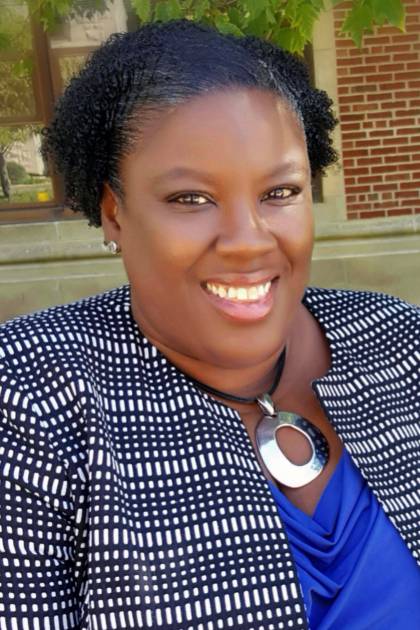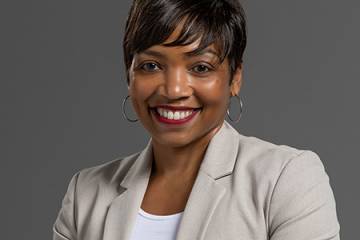Katrina Myers Caldwell, vice chancellor for diversity and community engagement at the University of Mississippi, will join Johns Hopkins University on July 1 as its vice provost for diversity and inclusion and chief diversity officer.

Image caption: Katrina Myers Caldwell
Caldwell has more than 26 years of progressive leadership experience in higher education and established diversity programs at several Chicago-area higher education institutions starting in the mid-1990s. Since 2017, she has coordinated the University of Mississippi's efforts to support student, faculty, and staff diversity and success, to foster an inclusive campus learning and working environment, to advance community engagement, and to formalize strong community partnerships.
Caldwell was chosen following a nationwide search launched last fall under the auspices of a committee co-chaired by Nancy Kass, vice provost for graduate and professional education, and Ashley Llorens, chief of the Intelligent Systems Center at APL and chair of the university's Diversity Leadership Council.
"Understanding the vast array of perspectives across Johns Hopkins is more important than ever as we figure out how to move forward as one university," Llorens said. "Katrina's expertise and leadership will be essential to getting this right—I can't wait to work with her on the Diversity Leadership Council."
Caldwell said she was interested in Hopkins because it's a "Research 1" institution with both the resources and the drive to become a leader in the national conversation on diversity and equity in higher education.
"I was drawn to Johns Hopkins as an institution that has a reputation for and commitment to these efforts on campus as well as nationally and locally," Caldwell said. "I look forward to joining Johns Hopkins and bringing innovation and creativity to this work in order to move the needle forward in a meaningful way around diversity, equity, and inclusion so that maybe 20 years from now, we're having a different conversation."
At Johns Hopkins, Caldwell will align diversity and inclusion initiatives with university priorities, serve as the primary steward of the Johns Hopkins Roadmap on Diversity and Inclusion, and coordinate and collaborate with the university's divisions on diversity and inclusion activities. She will also work closely with a team of individuals leading diversity and inclusion initiatives at JHU's schools and divisions and serve as ex officio co-chair of the Diversity Leadership Council.
Caldwell succeeds Fenimore Fisher, who left Johns Hopkins in July 2019 to lead diversity and inclusion at the multinational law firm DLA Piper LLP.
"I am grateful to the search committee for identifying excellent finalists for this critical university-wide position and am delighted with the outcome," said Sunil Kumar, Johns Hopkins University's provost and senior vice president for academic affairs. "Katrina has a proven track record of driving positive changes throughout her career, and I look forward to her leading and coordinating our diversity and inclusion efforts across Johns Hopkins for years to come."
Caldwell's interest in her field is informed by her own experiences as a first-generation college student and a realization in graduate school that she wanted to help others like her. After receiving a bachelor's degree in English literature at Spelman College, she earned both a master's degree and a PhD in English literature from the University of Illinois at Chicago, College of Liberal Arts and Sciences.
Caldwell planned to become an English professor and was hired during the summer after her first year of graduate school to teach English composition to students in the federally supported college readiness program TRIO/Bridge for first-generation and low-income first-year students entering at the University of Illinois at Chicago. She wound up teaching a course on the ins and outs of the college experience, she said, from navigating campus to understanding the financial aid process.
"As a first-generation college student, I did not know how to go through the financial aid process, what semesters were—I knew nothing," Caldwell said. "I had very limited cultural capital or cultural knowledge about college. So, when I got to engage with students who faced those same challenges, it changed everything for me. I started to look for opportunities where I could do more for them."
The experience led Caldwell to change course to pursue a career in multicultural student affairs in the Chicago area. She spent two years as the director of the Higher Education Basics Program and Student Assessment and Outcomes at East-West University, Chicago. From 1998 to 2004, Caldwell was assistant dean of minority affairs at the University of Illinois at Chicago, where she successfully implemented a strategic plan to increase outreach to prospective students, improve the retention and graduation rates of graduate fellowship students, and create professional development programs. She then went to DePaul University in Chicago, where she was director of adult student affairs from 2004 to 2008 before becoming the director of the Center for Intercultural Programs from 2008 to 2012, serving on the President's Diversity Council that was responsible for DePaul's universitywide diversity strategic plan.
Caldwell spent the next four years as assistant vice president for diversity and equity at Northern Illinois University in DeKalb before taking her current role as the inaugural chief diversity officer at the University of Mississippi.
"Far too many students now have stories that still sound so much like my story," Caldwell says. "There's still so much progress to be made."
The COVID-19 pandemic has put her work into an even sharper focus, she said.
"This is the exact moment when the work that we've been doing around diversity, equity, and inclusion should show up," Caldwell said. "It's extremely important for us to speak up, speak out, and engage around equity and inclusion and diversity during this crisis. We use the term 'new normal,' but the reality is for many people, lack of access is their normal. This is a tremendous opportunity to better understand the daily experience of those who do not have access to what they need to be successful."
Posted in University News, News+Info
Tagged university administration, diversity









